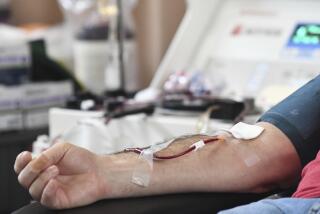AIDS Test Urged for Some Who Got Blood
- Share via
WASHINGTON — While emphasizing that “the risk of (AIDS) transmission by transfusion is low,” federal health officials formally recommended Thursday that physicians consider offering the AIDS antibody test to some patients who received blood transfusions between 1978 and 1985.
“This consideration should be based on the likelihood of infection in a recipient and the likelihood of transmission from that recipient,” the Centers for Disease Control said. “The risk of infection is greatest if the recipient received large numbers of transfusions and if the blood was collected during the few years before screening in an area with a high incidence of AIDS.”
The agency said that the decision to recommend the test for transfusion recipients grew from concern in the last year after four long-term leukemia patients in New York City, an area with a high prevalence of infection and the largest number of AIDS cases in the country, developed symptoms of AIDS-related complex, an associated AIDS condition. All four tested positive for AIDS infection.
Study Includes 204 Patients
A subsequent study was conducted of other leukemia patients who had received multiple transfusions and had no other risk factors for AIDS, such as intravenous drug use or sexual activity with an infected person. Blood tested from a total of 204 patients--including blood from 182 who had already died--indicated that 16 persons had become infected with the AIDS virus.
The test indicates whether an individual has been exposed to the virus that causes AIDS, not whether he or she will contract the deadly disease. However, a person who tests positive is presumed to be infected and infectious to others.
CDC officials, citing two case studies, said they were further worried about transmission of the virus by those who had become infected through transfusions.
Wife Develops Cancer
In the first case, an elderly man with no known risk for AIDS received multiple transfusions in early 1982, including one from a donor who later tested positive for AIDS. The transfusion recipient developed AIDS in 1983 and died the next year. In late 1984, his wife, with whom he had had been sexually active, developed a form of cancer characteristic of AIDS.
In the second, a pregnant woman with no other risk factors for AIDS received four units of blood in 1978, including one from a donor who later tested positive. A son, born in 1980, became ill at the age of 13 months and died of an AIDS-related infection in 1986. The CDC estimated that as many as 12,000 Americans may have been infected with the AIDS virus through blood transfusions between 1978 and 1985, out of the total of 1.5 million Americans now believed to be infected. Since 1985, when the test was introduced to screen all donated blood, the danger of contracting AIDS through a transfusion has been considered slight.
Recommends Tests
In March, 1986, the Public Health Service recommended that the test be taken voluntarily by members of high risk groups, primarily homosexual and bisexual men, intravenous drug users and their sexual partners, who compose nearly 90% of the cases in this country.
AIDS, or acquired immune deficiency syndrome, destroys the body’s immune system, leaving it powerless against certain cancers and otherwise rare infections. It is commonly transmitted through anal and vaginal sexual intercourse, through the sharing of unsterilized hypodermic needles and by woman to fetus during pregnancy. As of Monday, 19,021 Americans had died of AIDS.
Heterosexuals flood AIDS testing clinics. Part V, Page 1.
More to Read
Sign up for Essential California
The most important California stories and recommendations in your inbox every morning.
You may occasionally receive promotional content from the Los Angeles Times.













